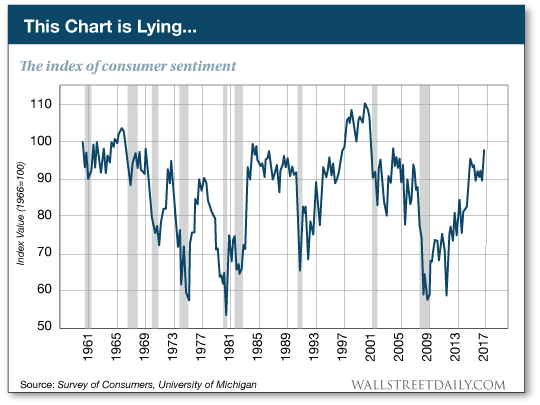3 reasons why gold prices are surging again
Consumer confidence is booming in America.
Well, let me clarify…
A peek at the chart of the official Consumer Sentiment Index paints a picture of booming confidence.
But charts can sometimes be liars.
So I decided to drill down on the confidence data myself.
What I discovered was shocking.

As it turns out, the chart is a worse liar than Hillary Clinton.
When you filter the data to represent only consumers who are Democrats, the index drops to 55.3 — which is a cautionary signal of a deep recession.
Ah, but run the filter for Republicans only, and the index balloons to 122.4 — signaling that an era of wonderful prosperity lies ahead.
Bottom line, we’re a historically divided nation.
And with corporate tax reform up next, the epic divide could get even deeper.
I asked my senior analyst Martin Hutchinson to address the delicate issue of tax reform.
So please make the proper tweaks to your portfolio before it’s too late.
Question: Martin, Paul Ryan already blew health care reform, but now he’s placing his full attention toward big corporate tax reform.
Can he get a win under his belt this time around?
Martin Hutchinson: Not if he does it the way the corporations want him to. Because just as on health care reform, the lobbyists have a wish list on corporate tax. They want a territorial system — whereby they get taxed in the U.S. only on U.S. income. And that’s a terrible idea.
I’ll tell you why. At present, they get taxed on worldwide income wherever it comes from, but only when the income is brought back to the U.S. The system dates back to 1962, and it costs the fisc about $26 billion annually.
There are three problems… Firstly, this system encourages corporations to invest abroad, because they get a lower tax rate. Secondly, it leaves a huge pile of cash overseas — about $2 trillion at the moment (of which Amazon’s got $100 billion). That can’t be used to build U.S. business before paying tax on it. Thirdly, it’s grossly unfair. If an individual earns money overseas, they’ve got to pay tax immediately on all of it except a measly $75,000.
Question: Clearly, the current system isn’t working. I think you’ve stated that. But why is a territorial system, perhaps, even worse?
Martin Hutchinson: The territorial system is worse because then they won’t pay tax on international income at all. They would use transfer pricing and tax havens to make all their international operations tax-free.
Consider if, for example, they’re earning some money in France, which has a high tax rate… If you fiddle the transfer prices, you can make yourself earn very little in France and have a holding company in the Cayman Islands. One that earns all the money tax-free.
Essentially, that would make international operations even more attractive relative to domestic ones. It would cause a giant sucking sound of money rushing out of the U.S. toward foreign operations. Of course, it’s even more unfair against individuals.
Question: If you could advise Paul Ryan on this, what would you recommend he do?
Martin Hutchinson: Well, I think they should have a worldwide tax system for paying tax exactly when it’s earned — by all means deducting foreign tax paid. If you pay a lot of tax in France, that needs to be deducted against U.S. tax. That’s how earnings are recorded in the books. Because if you earn $1 million in France, it immediately comes in this year’s income statement.
This would level the playing field between corporations and individuals. It would also level the playing field between domestic and foreign — because you’d pay the same rate of tax on both.
If you wanted to, and it would make sense, you could then lower the overall corporation tax rate from the current 35% to, say, 25% to compensate.
Question: I think we both agree that some type of reform is coming, Hutch. So what’s the bottom line for investors?
Martin Hutchinson: I think they’ll cut out some of the loopholes in corporate tax. Probably not this one, though. And they will cut the tax rate perhaps to 25%.
The bottom line for investors is that companies that currently pay tax at a high rate will benefit from the tax rate coming down. For example, at the moment, Lowe’s Companies Inc (NYSE:LOW) has paid tax at over 40% every year from 2013–16.
That’s a big winner if the tax rate goes to 25%. It increases its earnings by 25%, because instead of keeping $0.60 on the dollar, it keeps $0.75 on the dollar. So Lowe’s forward P/E is currently 15.6. But that goes to 12.4 with the new tax rate. In addition, Lowe’s also yields 1.7%. So I think it’s a pretty attractive play on corporate tax reform.
Question: Fantastic insights, Hutch. Thanks for your time.
Martin Hutchinson: …great pleasure.
Question: This is Wall Street Daily signing off.
